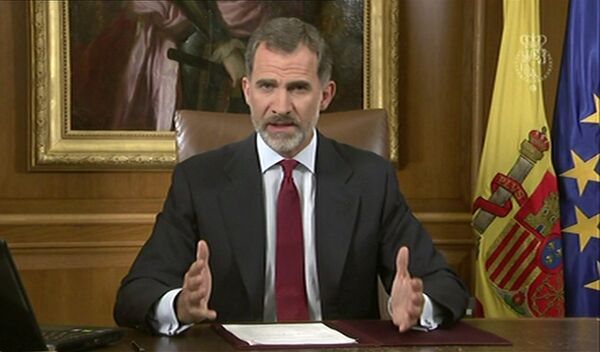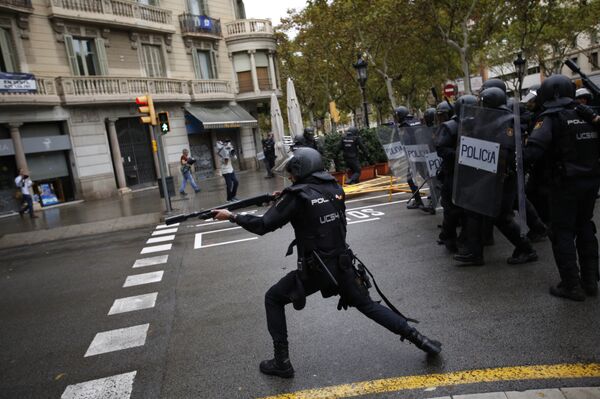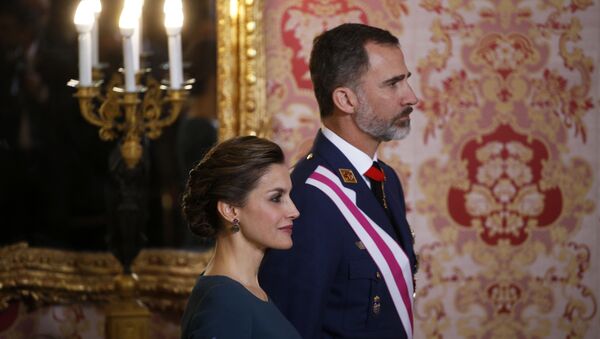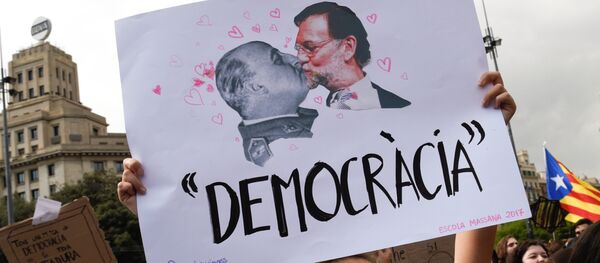Many Spaniards had become frustrated by King Felipe's silence on Catalonia's attempts to secede from Spain and the police violence over the last few days. Mary Vincent, a Professor of Modern European History at Sheffield University, said King Felipe's criticism of the Catalan nationalists, in a dramatic televized speech on Tuesday, October 3 should not come as a surprise.
"He is a constitutional monarch and he sees his role as defending the constitution, which is what he was doing. For the monarch to come out in favor of anything but a unitary state is very hard to envisage. He is king of all the Spaniards, and that includes the Catalans," Professor Vincent told Sputnik.

Prof. Vincent explained the sensitive role of the monarchy in Spain.
When the dictator Francisco Franco died in 1975, King Juan Carlos succeeded him as head of state. According to Dr. Vincent, it had been arranged beforehand and there was at that stage no indication that Juan Carlos was a democrat. She called it a regime change.
"It was the King and significant other players within the Francoist bureaucracy dismantling the authoritarian state and restoring democracy."
To the most intransigent parts of the regime — the army and Franco's old party — the question of the regions was key, she explained. The idea of a non-unitary Spain was anathema to them and there was never going to be a federal option.
"The Basques and ETA were the danger at the time, rather than Catalonia, but the compromise was a unitary state with autonomous regions. Catalonia, the Basque Country and Galicia would get autonomy and that autonomy has increased over the years to the point where Catalonia has a great deal of control of its own affairs," she told Sputnik.
The current situation is "intractable, according to Professor Vincent, following the announcement by the region's President Carles Puigdemont that Catalonia will proclaim independence from Spain within several days. She noted it was deeply ironic that the move has been triggered by Catalonia and not the Basque Country.
However, the "disproportionate response of the authorities at the weekend has made it more likely and it is telling that the King did not even allude to the violence," she argued.

Different Circumstances
In February 1981 Felipe's father, King Juan Carlos I, played a crucial role when, during the middle of an attempted coup by right-wing Guardia Civil officers.
He went on television in the full dress uniform of the commander in chief of the military, and ordered army units to remain loyal to the elected government and return to barracks.
"But the circumstances there were very different. There were troops surrounding the parliament building and tanks on the streets of Valencia. It was a very different situation," Prof. Vincent told Sputnik.
She said there were rumors on that occasion that Juan Carlos had been playing tennis moments before he was called upon to make the broadcast.
The Decline of Monarchy
The monarchy's popularity went into steep decline in the 1920s as it was perceived to be on the side of reactionary elements in the army, the Catholic Church and the landowning classes.
In 1931 King Alfonso XIII stepped down as monarch and went into exile, paying the price for supporting the dictator Miguel Primo de Rivera.
The Republicans — who despised the monarchy and the landowning classes — were defeated in the 1936-38 Spanish Civil War, but the victor, Francisco Franco, chose not to restore the monarchy and ruled himself as Generalissimo.
As he approached his death in 1975 Franco invited Alfonso's grandson Juan Carlos back to Spain to resume his throne.
Juan Carlos played a crucial role in the late 1970s, steering Spain away from Francoism and back towards the parliamentary democracy of Western Europe. King Juan Carlos fell out of favor in his later years, being criticized for going on an elephant-hunting trip to Botswana in 2012.
Princess Cristina was acquitted of fraud earlier this year.
Juan Carlos abdicated in 2014, aged 76, in favor of his son Felipe, who now has the task of trying to keep Spain together.





